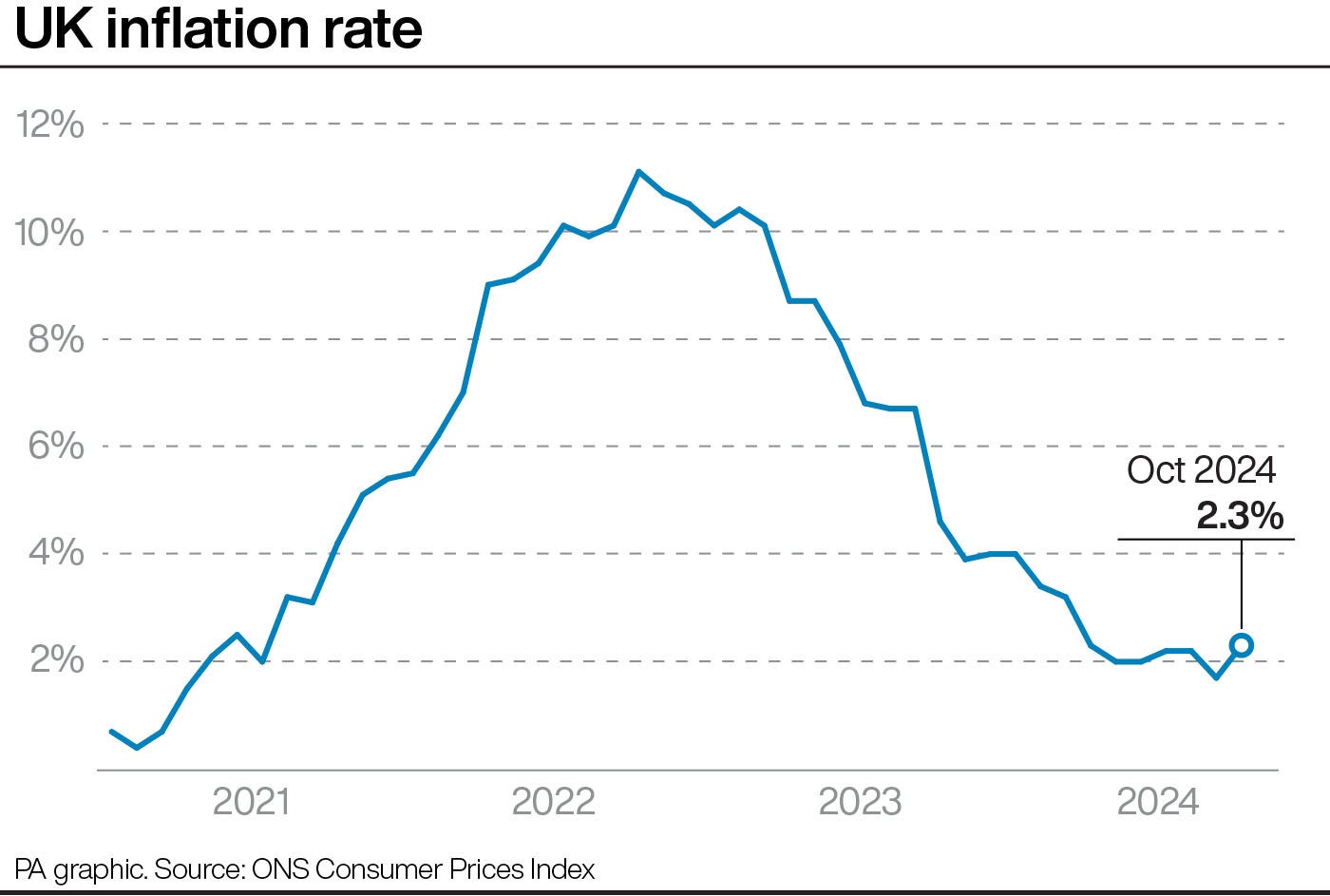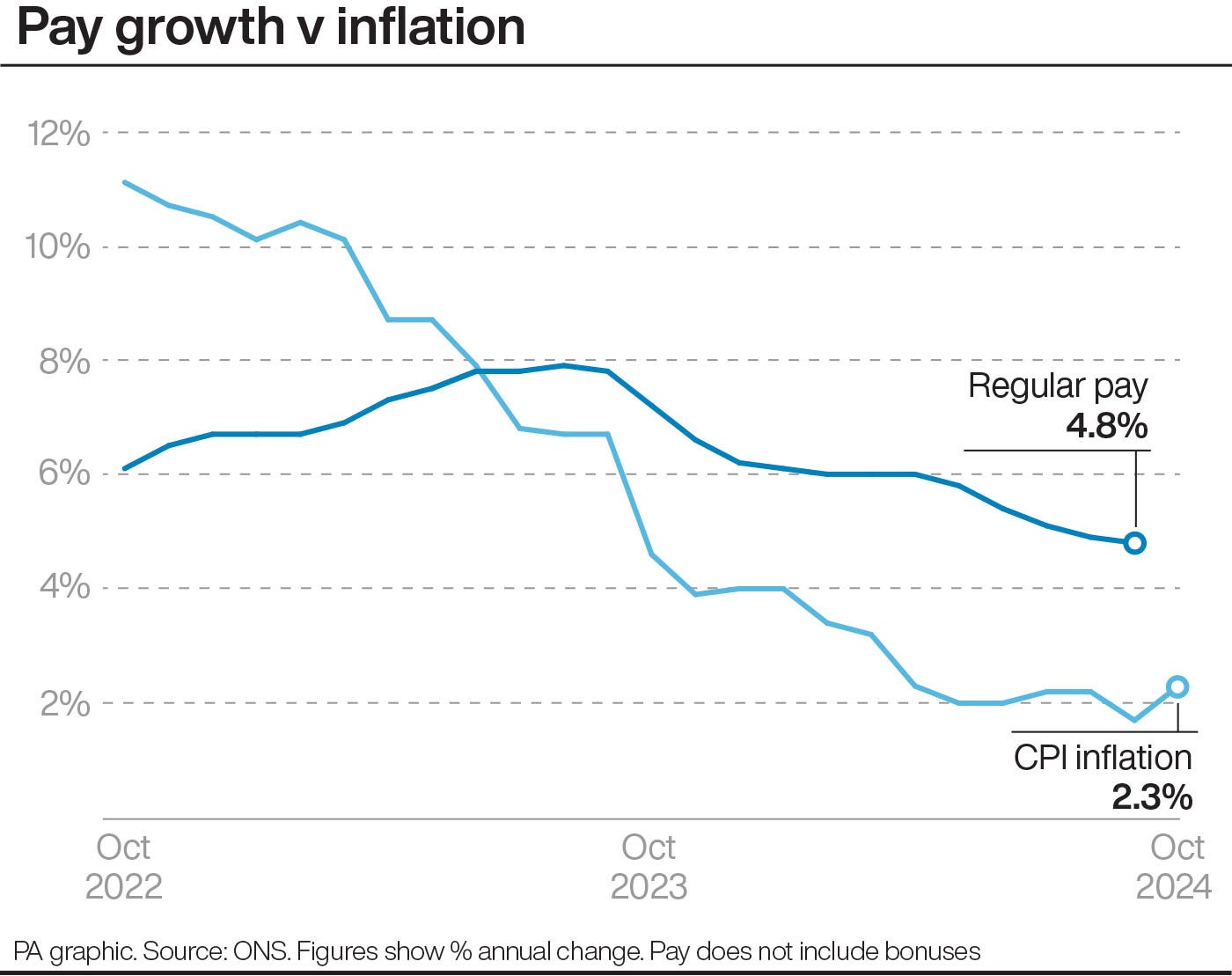
Inflation in the UK lifted to a six-month high of 2.3% in October, official data has revealed.
The Office for National Statistics said inflation rebounded from the three-year-low it recorded in September to surpass the 2% target rate set by the Bank of England and UK Government.
Here the PA news agency looks at what the latest inflation data means for households and the economy.
– What is inflation?
Inflation is the term used to describe the rising price of goods and services.
The inflation rate refers to how quickly prices are going up.
October’s inflation rate of 2.3% means that if an item cost £100 a year ago, the same thing would now cost £102.30.
It is above than the 1.7% inflation rate recorded in September meaning that prices are increasing more quickly than they previously were.
– Is inflation rising for everything?
The latest figures showed that a number of key areas have seen stronger inflation, or a reduction in recent deflation, but not everything.
In fact, motor fuel price rises were lower for the month and dragged down on the overall inflation rate.
Live music and theatre ticket price rises also dropped for the month.
– What made inflation go up?
The largest single driver of the rise in the inflation rate was energy prices.
The average price of gas fell in the year to October by 7.3%, but this was a much smaller drop than the fall of 22.8% in the year to September.
The latest fall in the price of electricity also slowed sharply for the month.
This came after energy regulator Ofgem increased its energy price cap by around 10% in October, increasing the cost of the average household energy bill by £149 a year.
Another big factor in the overall rise in inflation last month was the cost of air travel.
The ONS said that air fares swung from a drop of 5.0% in the 12 months to September to a sharp rise of 6.6% in the year to October.

– Will the cost of living itself ever fall?
The Government does not want prices to fall. It sets the Bank of England, the UK’s central bank, a target to keep the inflation rate at 2%.
It says this is the ideal level to help people and businesses plan their spending.
Nevertheless, some items are cheaper than they were a year earlier, such as pasta, cheese and milk.
– Will inflation keep rising?
Inflation is expected to rise further before it starts falling again back to the 2% target level.
The Bank of England said earlier this month that it expects the rate of inflation to steadily rise to a peak of around 2.8% in third quarter of 2025.
It is then not expected to remain steadily at 2% until 2027, according to the central bank.
ING developed markets economist James Smith has suggested inflation could continue to increase more sharply than the Bank of England has forecast, suggesting that CPI inflation “could get close to 3% in January”.
– What does the rise in inflation mean for interest rates?
Mr Smith is among economists to suggest that the latest increase in inflation “reduces the chance” of a rate cut by members of the Bank of England’s monetary policy committee (MPC) last month.
The central bank had already been widely expected to hold rates at 4.75% in next months meeting, before potential further cuts next year.

Thomas Pugh, economist at RSM UK, said service inflation, which has been sticky in recent months, is expected to come down which might encourage policymakers to gradually reduce the base interest rate.
“A rate cut in December looks very unlikely, but we’re expecting one cut a quarter next year to leave rates at 3.75% by the end of 2025,” he said.
– Is the rise in inflation linked to the Government?
The latest data comes weeks after the Government announced a raft of major spending and tax measures in last month’s autumn Budget.
The data for October is therefore too early to include a notable impact from policy changes by the Chancellor.
However, economists will be keeping an eye on how recent policy measures feed through into the CPI data.
The Government’s official forecaster, the Office for Budget Responsibility, increased its inflation predictions for the next five years last month.
The OBR said the sharp increase in spending, almost £70 billion extra each year, announced by the Chancellor would contribute to higher inflation in the short-term, but will also help drive stronger economic growth.
A number of businesses, such as Sainsbury’s, have also suggested that tax hikes and wage increases are set to contribute to higher inflation for shoppers.







